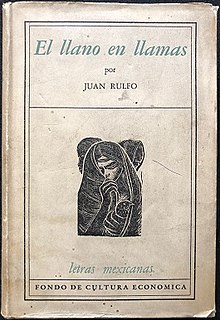El Llano en llamas

First edition
|
|
| Author | Juan Rulfo |
|---|---|
| Original title | El Llano en Llamas (Spanish) |
| Translator | into English: George D. Schade; Ilan Stavans into French: Gabriel Iaculli |
| Country | Mexico |
| Language | Spanish translated into French and into English |
| Genre | Short story collection |
| Publisher | Fondo de Cultura Económica |
|
Publication date
|
1953 |
| Pages | 170 pp |
| ISBN | |
| OCLC | 20956761 |
El Llano en Llamas (translated into English as "The Burning Plain and other Stories" and as "The Plain in Flames") is a collection of short stories written in Spanish by Mexican author Juan Rulfo and first published in 1953.
This collection and a novel entitled Pedro Páramo published within three years of each other in the 1950s established Rulfo's literary reputation. One review of these stories praises these seventeen tales of rural folk because they "prove Juan Rulfo to be one of the master storytellers of modern Mexico....". The reviewer also noted that Rulfo
In his introduction to the Texas edition, translator George D. Schade describes some of the stories as long sustained interior monologues ("Macario", "We're very poor", "Talpa", "Remember"), while in other stories that may have otherwise been essentially monologues dialogues are inserted ("Luvina", "They have Given Us the Land" and ""Anacleto Morones"). A few stories, according to Schade, are scarcely more than anecdotes like "The Night They Left Him Alone".
The short stories in El llano en llamas are set in the harsh countryside of the Jalisco region where Rulfo was raised. They explore the tragic lives of the area's inhabitants, who suffer from extreme poverty, family discord, and crime. With a few bare phrases the author conveys a feeling for the bleak, harsh surroundings in which his people live.
The French writer J.M.G. Le Clézio, who was the 2008 Nobel literature laureate, mentioned in his Nobel Lecture not only the writer Juan Rulfo, but also these short stories El Llano en llamas and novel Pedro Páramo.
Written like a monologue, where an orphaned town idiot named Macario describes in his flowing narrative a few of the special aspects of his everyday life. In "Macario", the past and present mingle chaotically, and frequently the most startling associations of ideas are juxtaposed, strung together by conjunctions which help to paralyze the action and stop the flow of time in the present. Rulfo succeeds in this excellent story in capturing the sickly atmosphere surrounding the idiot boy, who is gnawed by hunger and filled with the terror of hell, and protected, and at the same time exploited, by his Godmother and the servant girl Felipa.
"The story begins with the narrator hearing the sound of dogs barking after walking for hours without coming across a trace of anything living on the plain".They gave us the land depicts the results of the government's land reform program for four poor countrymen who have been given a parcel of land. They march across a barren plain to reach their property, which is located too far from any source of water to be of any use to them.
...
Wikipedia
